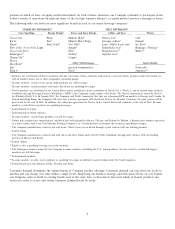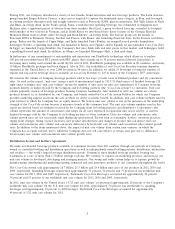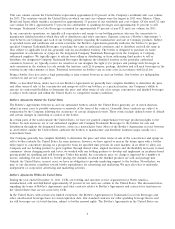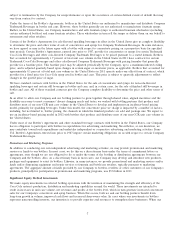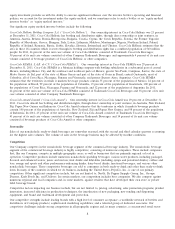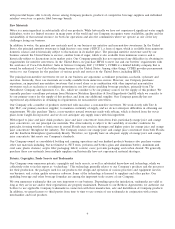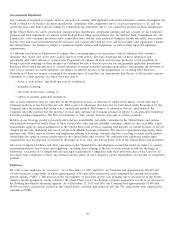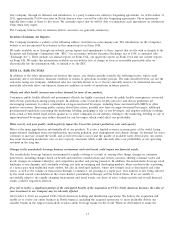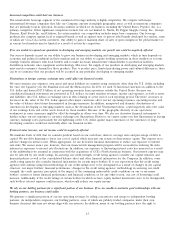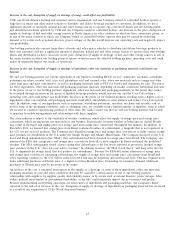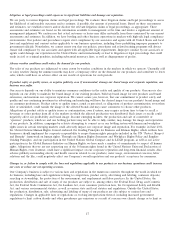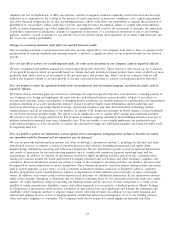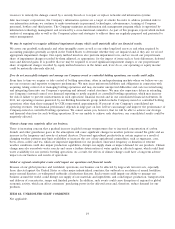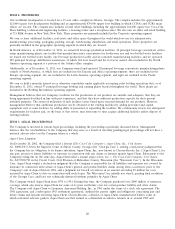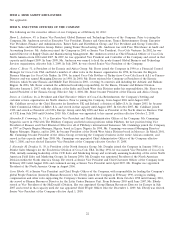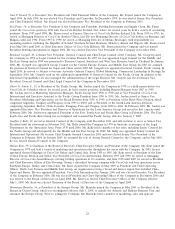Coca Cola 2011 Annual Report Download - page 16
Download and view the complete annual report
Please find page 16 of the 2011 Coca Cola annual report below. You can navigate through the pages in the report by either clicking on the pages listed below, or by using the keyword search tool below to find specific information within the annual report.manufacture or distribute their own products or certain products of other beverage companies. If we are unable to provide an
appropriate mix of incentives to our bottling partners through a combination of pricing and marketing and advertising support, or
if our bottling partners are not satisfied with our brand innovation and development efforts, they may take actions that, while
maximizing their own short-term profits, may be detrimental to our Company or our brands, or they may devote more of their
energy and resources to business opportunities or products other than those of the Company. Such actions could, in the long run,
have an adverse effect on our profitability.
If our bottling partners’ financial condition deteriorates, our business and financial results could be affected.
We derive a significant portion of our net operating revenues from sales of concentrates and syrups to our bottling partners and,
therefore, the success of our business depends on our bottling partners’ financial strength and profitability. While under our
bottling partners’ agreements we generally have the right to unilaterally change the prices we charge for our concentrates and
syrups, our ability to do so may be materially limited by our bottling partners’ financial condition and their ability to pass price
increases along to their customers. In addition, we have investments in certain of our bottling partners, which we account for
under the equity method, and our operating results include our proportionate share of such bottling partners’ income or loss. Our
bottling partners’ financial condition is affected in large part by conditions and events that are beyond our and their control,
including competitive and general market conditions in the territories in which they operate; the availability of capital and other
financing resources on reasonable terms; loss of major customers; or disruptions of bottling operations that may be caused by
strikes, work stoppages, labor unrest or natural disasters. A deterioration of the financial condition or results of operations of one
or more of our major bottling partners could adversely affect our net operating revenues from sales of concentrates and syrups;
could result in a decrease in our equity income; and could negatively affect the carrying values of our investments in bottling
partners, resulting in asset write-offs.
Increases in income tax rates or changes in income tax laws could have a material adverse impact on our financial results.
We are subject to income tax in the United States and in numerous other jurisdictions in which we generate net operating
revenues. Increases in income tax rates could reduce our after-tax income from affected jurisdictions. In addition, there have been
proposals to reform U.S. tax laws that could significantly impact how U.S. multinational corporations are taxed on foreign
earnings. We earn a substantial portion of our income in foreign countries. Although we cannot predict whether or in what form
these proposals will pass, several of the proposals being considered, if enacted into law, could have a material adverse impact on
our tax expense and cash flow.
Increased or new indirect taxes in the United States or in one or more of our other major markets could negatively affect our
business.
Our business operations are subject to numerous duties or taxes that are not based on income, sometimes referred to as ‘‘indirect
taxes,’’ including import duties, excise taxes, sales or value-added taxes, property taxes and payroll taxes, in many of the
jurisdictions in which we operate, including indirect taxes imposed by state and local governments. In addition, in the past, the
United States Congress considered imposing a federal excise tax on beverages sweetened with sugar, HFCS or other nutritive
sweeteners and may consider similar proposals in the future. As federal, state and local governments experience significant budget
deficits, some lawmakers have proposed singling out beverages among a plethora of revenue-raising items. Increases in or the
imposition of new indirect taxes on our business operations or products would increase the cost of products or, to the extent
levied directly on consumers, make our products less affordable, which may negatively impact our net operating revenues.
If we are unable to renew collective bargaining agreements on satisfactory terms, or we or our bottling partners experience strikes,
work stoppages or labor unrest, our business could suffer.
Many of our associates at our key manufacturing locations and bottling plants are covered by collective bargaining agreements.
With the acquisition of CCE’s North American business on October 2, 2010, the number of our associates in North America
represented by labor unions substantially increased to approximately 19,000 as of December 31, 2011. While we generally have
been able to renegotiate collective bargaining agreements on satisfactory terms when they expire and regard our relations with
associates and their representatives as generally satisfactory, negotiations in the current environment remain challenging, as the
Company must have competitive cost structures in each market while meeting the compensation and benefits needs of our
associates. If we are unable to renew collective bargaining agreements on satisfactory terms, our labor costs could increase, which
would affect our profit margins. In addition, many of our bottling partners’ employees are represented by labor unions. Strikes,
work stoppages or other forms of labor unrest at any of our major manufacturing facilities or at our or our major bottlers’ plants
could impair our ability to supply concentrates and syrups to our bottling partners or our bottlers’ ability to supply finished
beverages to customers, which would reduce our net operating revenues and could expose us to customer claims.
14


